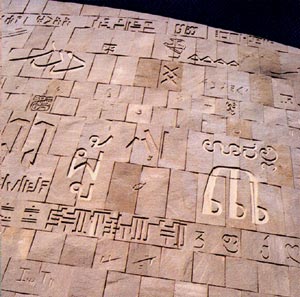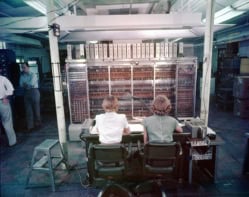The Forgotten Revolution: How Science Was Born in 300 BC and Why It Had to Be Reborn
Lucio Russo
2003 Springer 487pp £69.00/789.95hb
In The Forgotten Revolution Lucio Russo makes the extraordinary claim that our entire perception of the history of science from the death of Aristotle in 322 BC to Newton’s Principia is completely wrong. He argues that between 300 BC and 150 BC there was an extraordinary flowering of science, and of what we would today call the scientific method, in the Hellenistic world, centred on Alexandria. This is supposed to have far exceeded anything achieved by the Greeks of the classical period (500-300 BC).
What makes Russo’s thesis hard to prove or disprove is that very little of this later Hellenistic work has survived. According to the author, who is a physicist at the University of Rome Tor Vergata, Roman writers had these original texts but could not understand what they meant. The texts were later lost, and Russo speculates at length about what they might have contained. He then makes a further startling claim that most of the breakthroughs of the Renaissance were primarily due to the possession by Copernicus, Kepler, Galileo and others of these great works, which have regrettably been lost again since then. But although these scientists owed a debt to the Greek past that we know about, to say that they owed everything to texts now lost is pure and unconvincing speculation.
The leading figures in this book are Euclid, Aristarchus, Herophilus, Ctesibus, Archimedes, Eratosthenes, Appolonius, Hipparchus and Poseidonius. Of this group, only the work of Euclid (c.300 BC) survives in any major form, and there can be no disputing that his Elements – together with the Conics of Apollonius and the invention of trigonometry by Hipparchus – represents a monumental achievement of the classical and Hellenistic period. Even Newton was still using Euclidean proofs in Principia, and the Elements were still being taught at school when I was a child. However, these achievements were triumphs of mathematics, rather than science, and Russo relies on a rather unfocused definition of science to allow him to include Euclid in his case.
If we first take Hipparchus, who lived from about 190-120 BC, nothing of any importance survives from his many texts, although we know a great deal about his work from the Almagest of his disciple Ptolemy. As Arthur Berry wrote in 1898, “An immense advance in astronomy was made by Hipparchus, whom all competent critics have agreed to rank far above any other astronomers of the ancient world, and who must stand side by side with the greatest astronomers of all time.” If anything, Russo underestimates the achievements of Hipparchus. For example, the author does not even mention his discovery of the precession of the equinoxes.
Russo’s main interest is instead to show that the Alexandrians had a fully developed theory of the solar system that placed the Sun at the centre, and that most of the ingredients of a theory of gravity – even including an inverse-square law – were in place. Frankly this seems far-fetched.
We know that Aristarchus (c.320-250 BC) proposed a heliocentric view, because this was mentioned by Plutarch and Simplicius in the Roman period and by Seleucis and others during the Middle Ages. However, Aristarchus’s heliocentric world does not seem to have had much impact in the Hellenistic world since Ptolemy scarcely bothers to mention it. Copernicus was, of course, fully aware of Aristarchus’s heliocentric proposal, and probably of Arab commentary on it, but the fully worked-out heliocentric model that he published in De Revolutionibus in 1543 was a remarkable achievement in its own right.
Another important figure of the Hellenistic period is Archimedes, who lived in the third century BC. His work on hydrostatics and on the mechanics of pulleys and levers represent a major advance from the discussions of Aristotle. From Heron’s Mechanica, a book mainly about mechanical toys written in the first century AD, and other sources, Russo weaves a picture of amazing mechanical and hydraulic engineering achievements in the intervening period. Given the many Roman efforts in hydraulic engineering, these achievements are certainly possible, but I would have expected there to be more archaeological artefacts to support this picture, if it were true.
So some elements of Russo’s thesis are not implausible. Others more expert than I will have to comment on how impressive the medical and biological achievements of Herophilus (born c.320 BC) are likely to have been, given that we mainly depend on the reports of the Roman writer Galen four centuries later. What is grating about this book, however, is the need for Russo to denigrate the work of Aristotle and other classical writers, and to belittle the achievements of Roman engineering and Renaissance science, at the altar of glorification of the presumed Alexandrian heyday (see “Was Aristotle the first physicist?”).
When we read Galileo and Newton, we find a new and modern approach to understanding the universe that is absent from anything surviving from the Greek world. Galileo describes his experiments and observations in detail so that anyone can repeat them. Newton gives the full mathematical basis for his theories so that anyone can check the calculations and apply them to other problems. If Newton were influenced by any of the ancient Greeks it was Aristotle, as Russo admits rather perplexedly given that elsewhere he has characterized Aristotle’s work as pretty worthless.
The Forgotten Revolution is full of fascinating detail, and the reconstruction of lost work is ingenious. But caveat emptor. What should have been a splendid hymn to Alexandrian achievement is undermined by the author’s excessive claims of its influence on Renaissance science, and by his underestimation of the importance of the seeds sown by Aristotle and others in the classical period.




